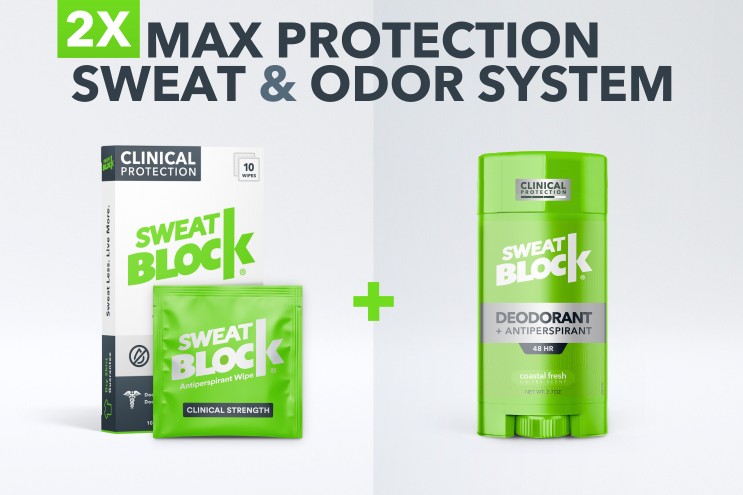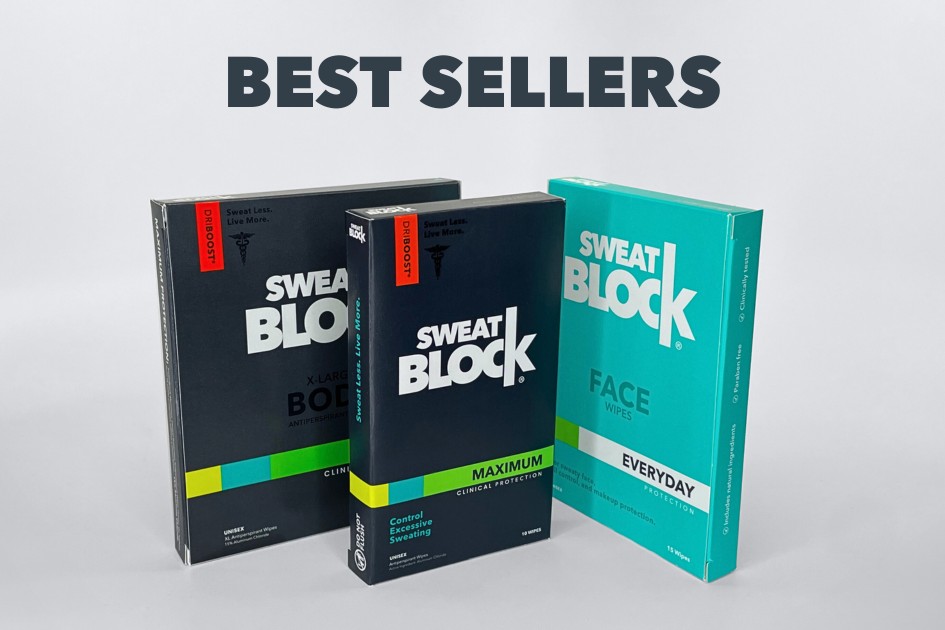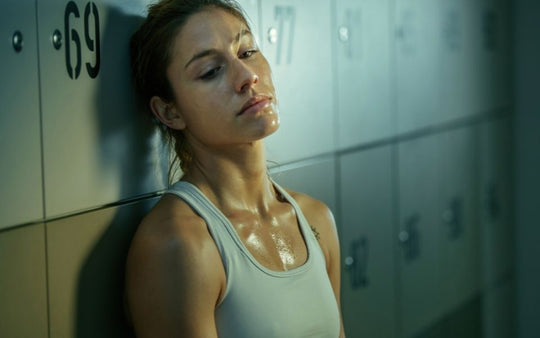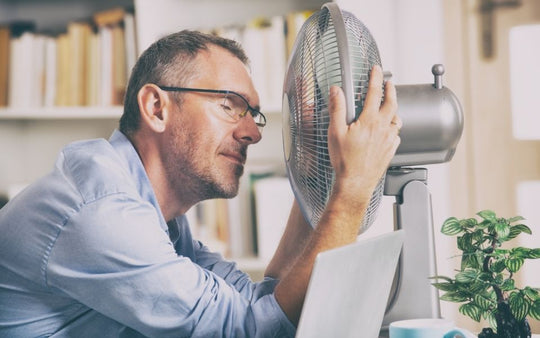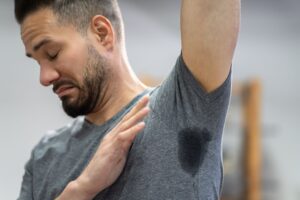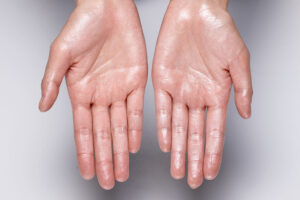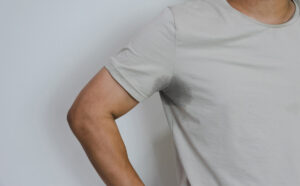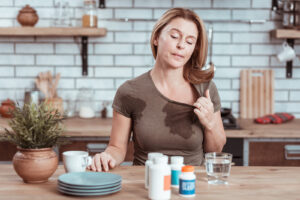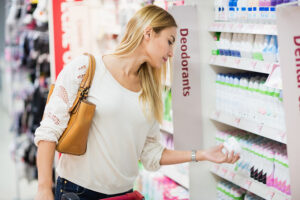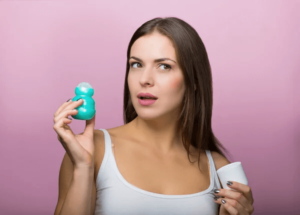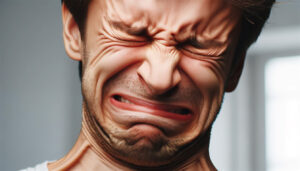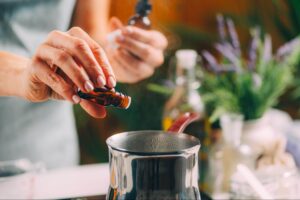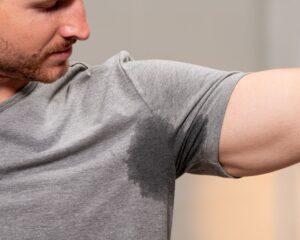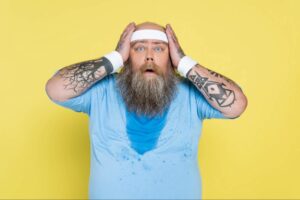Table of Contents
Can caffeine make you sweat? Yes!
After all, it is a stimulant.
Although legal, the caffeine found in coffee and tea is still a drug, and it can make you sweat by speeding up the central nervous system (CNS).
Pssst… while we’re chatting about sweat: These products will stop embarrassing sweat, guaranteed! ==> Check them out here!
In fact, the more caffeine you drink, the more likely you are to perspire.
Yikes!
If excessive sweating is a problem for you, cutting back on caffeine loaded products like these may help reduce unwanted sweat:
- Coffee
- Tea
- Energy drinks
- Soft drinks
- Chocolate (yep…chocolate)
- Over-the-counter stimulants (NoDoz and other caffeine pills)
- Over-the-counter pain medications (Excedrin)
- Pre-workout and weight loss supplements1
But according to researchers, you shouldn’t have to worry about side effects like sweating if you drink less than 300-400 mg a day. 2
Of course, there are some exceptions, but more on that later…
For now, let’s take an in-depth look at the science of caffeine and sweating:
What Is Caffeine?
Caffeine is a chemical stimulant in the methylxanthine class of psychoactive drugs.
It increases alertness and changes the way your brain and body function via the central nervous system (CNS).
Caffeine also impacts the cardiovascular and endocrine systems by elevating heart rate and boosting stress hormone production.
Why Does Caffeine Make You Sweat?
If you drink coffee or energy drinks daily and you’re wondering “why do I sweat so much?“, caffeine may be to blame for that extra sweat.
There are between 1.6 and 5 million sweat glands spread across the human skin. 6
When you’re stressed (or when you drink too much caffeine), the nervous system tells the body to release stress hormones like adrenaline and cortisol, elevates heart rate, and secretes sweat to cool the body and balance fluids.
There are two types of sweat glands: eccrine glands and apocrine glands…
Eccrine Glands vs. Apocrine Glands
Eccrine sweat glands regulate body temperature and are found in virtually every square millimeter of the skin, and they’re mostly concentrated in the forehead, palms, and soles of the feet.
This type of sweat is 98-99 percent water and does not cause body odor.
Apocrine sweat glands produce the majority of stress-related sweat, and they’re found in the armpits, groin, nipples, and eyelids.
Unlike eccrine sweat, apocrine sweat contains fats that deteriorate when mixed with bacteria on the skin…and body odor is born!
Does Coffee Make You Sweat?
Coffee is the most popular caffeine source worldwide, and if you drink enough of it, it can make you sweat.
In addition to sweating, high doses of coffee may cause symptoms like anxiety, dehydration, and dizziness.
The average 5 oz coffee contains about 85 mg of caffeine. 3
Does Decaf Coffee Make You Sweat?
Some people drink coffee for the energy boost, others drink it for the taste.
If you aren’t ready to part ways with coffee, decaf can a great way to cut back on caffeine.
A lot of people don’t know this, but decaf still contains at least 3 mg of caffeine per 5 oz cup, and many brands contain 7 mg or more. 3
Does Tea Make You Sweat?
Although tea contains less caffeine than coffee, it can still trigger sweating in high doses.
However, green and black teas have one major upside: they contain a potent nutrient called L-theanine that may help balance the stimulatory effects of caffeine…
L-theanine is an amino acid that boosts gamma-Aminobutyric acid (GABA) in the brain. GABA is the primary inhibitory neurotransmitter that reduces stress and calms brain activity.
The average bag of tea contains 30 mg of caffeine, although some black tea contains up to 40 mg or more. 3
Do Energy Drinks Make You Sweat?
Together, caffeine and sugar can supercharge the nervous system and increase the risk of sweating, and as it turns out, energy drinks have plenty of both.
Luckily, most brands have dialed-back their caffeine content over the years, but the average energy drink still contains the same amount of caffeine as two cups of coffee.
For example, Monster energy drinks contain 79.2 mg of caffeine per serving, or 158.4 mg per can. 4
Does Soda Make You Sweat?
If you want to say sayonara to sweating, you’ll have to ditch the soda too.
Like energy drinks, caffeinated sodas deliver a heavy-hitting combo of sugar and caffeine.
On average, soda contains 18 milligrams of caffeine in every 6-ounce serving. For example, one can of Coke contains 29.4 mg of caffeine. 5
Does Chocolate Make You Sweat?
Cocoa beans are closely related to coffee beans, and yes, they contain caffeine too.
There’s roughly 4 milligrams of caffeine in every 5 ounces of hot chocolate and 1.5-6.0 mg in every ounce of chocolate candy. 3
With that said, unless you have underlying medical conditions, you shouldn’t have to worry about sweating from chocolate.
How Much Caffeine Can You Drink Without Sweating?
According to a 2017 meta-analysis of 381 clinical trials and lab tests, the maximum daily caffeine dose is 400 mg for adults and 300 mg for pregnant women. 7
Another study recommends drinking less than 6 mg per kg of bodyweight to avoid side effects like poor calcium absorption and male infertility. 8
In other words, if you drink two cups of coffee or less, you should be in the clear.
With that said, caffeine-sensitive individuals should drink much less (or avoid it entirely)…
Are You Sensitive To Caffeine?
Because caffeine stays in your system for four to six hours, it can be easy to drink too much and feel anxious, hot, and sweaty.
Doses greater than 400 mg/day may cause caffeine overdose in healthy adults, but for sensitive individuals, negative side effects can occur at much lower doses.
Common side effects of caffeine overdose include:
- Irregular heartbeat
- Rapid heart rate
- Vomiting and other digestive issues
- Diarrhea
- Anxiety
- Feeling “edgy”
- Confusion
- Dizziness
- Fever
- Changes in alertness
- Muscle twitching
- Dehydration
- Increased urination
- Sweating
Increased sweating and urination are the body’s attempt to eliminate the extra caffeine and return to homeostasis.
Risk Factors of Caffeine and Hyperhidrosis (excessive sweating)
Hyperhidrosis is a medical condition characterized by excessive sweating. Drinking too much caffeine or coffee can trigger similar symptoms.
For example, a 2014 study published in the journal Menopause found a connnection between high caffeine intake and increased night sweats in postmenopausal women. 9
At the same time, a 2011 study found that caffeine can increase sweating by affecting the sudomotor nerves. 10
Common risk factors for the caffeine sweats include:
- Pregnancy
- Diabetes
- Hypoglycemia
- Autoimmune disease
- Obesity
- Menopause
- Overactive sympathetic nerves
- Infection
- Hypothyroidism (underactive thyroid gland)
- Hyperpituitarism (overactive pituitary gland)
- Social anxiety disorder
At the same time, it’s best to avoid foods like curry, hot sauce, and cumin as well as alcohol.
Of course, if symptoms are severe enough, there’s also a chance that you may have full-blown hyperhidrosis…
Signs and Symptoms of Hyperhidrosis
Everyone sweats, but if you sweat even when you don’t need to cool down, you might have hyperhidrosis.
According to a report by the Archives of Dermatological Research, hyperhidrosis affects roughly 15 million people in the U.S. alone, and it can seriously impact your quality of life.11
Common symptoms include:
- Sweating that interferes with daily tasks
- Visible sweating
- Night sweats
- Uncomfortable wetness in the groin, hands, feet, and underarms
- Frequent skin infections like athlete’s foot
Some people get so sweaty that they may even struggle to turn doorknobs or grip the steering wheel.
If necessary, your dermatologist can recommend treatments like prescription antiperspirants or anticholinergics: a class of medications that affect the nerves that cause sweating.
However, if sweating only occurs when you drink a lot of caffeine, staying dry may be as simple as cutting back on caffeinated drinks.
References:
- 1: https://www.ncbi.nlm.nih.gov/pmc/articles/PMC3625078/
- 2: https://www.sciencedirect.com/science/article/pii/S0278691517301709
- 3: https://www.ncbi.nlm.nih.gov/pubmed/8603790
- 4: https://fdc.nal.usda.gov/fdc-app.html#/food-details/171935/nutrients
- 5: https://fdc.nal.usda.gov/fdc-app.html#/food-details/175093/nutrients
- 6: https://www.sciencedirect.com/topics/medicine-and-dentistry/sweat-gland
- 7: https://www.sciencedirect.com/science/article/pii/S0278691517301709
- 8: https://www.ncbi.nlm.nih.gov/pubmed/12519715
- 9: https://www.sciencedaily.com/releases/2014/07/140723105945.htm
- 10: https://www.ncbi.nlm.nih.gov/pubmed/21883004
- 11: https://www.ncbi.nlm.nih.gov/pmc/articles/PMC5099353/
You might also like...

Why Do I Sweat So Much? And So Easily?
WHY DO I SWEAT SO MUCH? : ARTICLE CONTENTS Sweating a lot? … when you workout, sleep, after eating, or
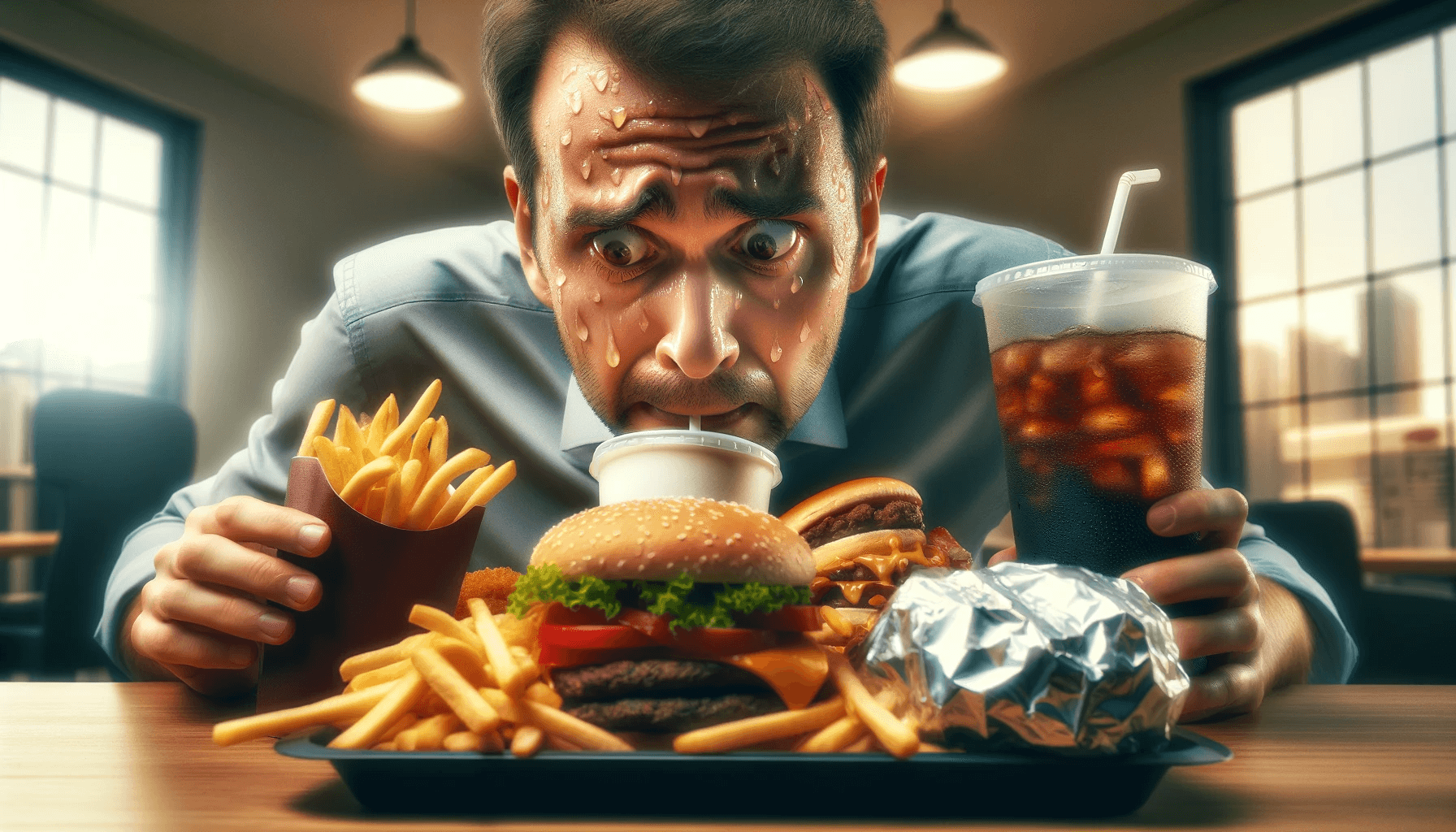
Tired of Sweating After Eating? Avoid These 8 Sweat Triggers
Table of Contents Have you ever wondered “why do i sweat when i eat?” Or why a delicious meal or

How to Stop Sweating So Much? 9 Tips to Beat Unwanted Sweat
If you’ve ever suffered through an awkward sweaty hug, a slippery handshake, or a sweat-soaked job interview — this article

